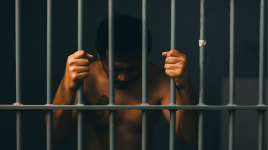Defendants With Disabilities Face Injustice At Every Level

The Australian inmate population is continuing its steep incline. In June this year, the number of adult inmates detained in the nation’s correctional facilities rose to 41,204, according to Australian Bureau of Statistics figures. This marks a 7 percent increase over the previous 12 months.
The rise is despite the rate of most major categories of crime having either fallen or remained stable since 2001.
The number of prisoners on remand – those refused bail and awaiting the finalisation of their cases – continues its rapid increase. Unsentenced inmates – who are meant to be presumed innocent until proven guilty – now make up 33 percent of the overall prisoner population.
The Indigenous incarceration rate also continues to skyrocket. In June this year, there were 11,456 First Nations people detained in Australian prisons.
Aboriginal and Torres Strait Islander people now make up 28 percent of the overall adult inmate population, while accounting for a little over 2 percent of the Australian adult population.
Inmates with disabilities
UNSW professor Eileen Baldry points out that more than half of those flowing through the Australian prison system are either on short sentences or unsentenced, and many aren’t recorded in the ABS “snapshot” figures.
According to the professor, over half of the 65,000 people going through Australian correctional facilities during 2015 had disabilities. These people often have mental or cognitive disabilities, and are highly vulnerable and disadvantaged.
A recent NSW Mental Health Commission report outlined that the overrepresentation of people with mental illness or cognitive impairment in the criminal justice system and prisons is so pronounced, it should be “assumed the norm.”
In Victoria, 42 percent of male inmates and 33 percent of women behind bars exhibit evidence of an acquired brain injury, according a 2015 Victorian Ombudsman report. Despite this, no system has been implemented to identify or support this vulnerable group.
Barriers to justice
Former Australian disability discrimination commissioner Graeme Innes wrote in 2014, that although “equality before the law is a basic tenet of human rights… that equality is not always available for Australians with disabilities in the criminal justice system.”
The Australian Human Rights Commission’s Equality Before the Law report listed five major barriers that people with disabilities face when dealing with the system.
The commission found that support programs and assistance to prevent violence, disadvantage and a range of other risk factors are often not available for people with disability. They also receive no support to begin or defend criminal matters, or participate in the criminal justice system.
People with disabilities are also confronted by negative attitudes that assume they’re unreliable or not capable of participating in legal proceedings. And little support or aids are provided to prisoners with disabilities, so that they can participate in life on the inside.
Unfit to Plead
Another major barrier that the commission report found was support, accommodation and programs are often unavailable to people with disabilities, “when they are considered unable to understand or respond to criminal charges made against them.”
This is referred to as being “unfit to plead.” If a person with a disability is deemed unfit to plead, it can result in them being placed in indefinite civil detention or under intensive supervision.
The Unfitness to Plead Project report released last month outlined that people with disabilities who are considered unfit to plead may be required to live in prison, a hospital or a service where they’re being watched, with no idea as to when they can leave.
Researchers pointed to the case of 19-year-old Marlon Noble, who, in 2001, was charged with sexual offences against two young girls. If he’d been found guilty, he was likely to have been sentenced to two to three years in prison.
However, this Indigenous man was found unfit to plead due to his intellectual disabilities. So, Mr Noble was imprisoned for ten years without a conviction, even after the alleged victims informed prosecutors that he hadn’t assaulted them.
Indigenous people with disability
Professor Baldry was part of a 2015 study that found Aboriginal and Torres Strait Islander people with disabilities are crowding the prison system. These people are basically being managed by police, the courts and prisons, as there is a lack of community-based services and support.
“It’s often seen to be the case that prison is the best place for them, because there’s nothing else for them in the community,” Professor Baldry told Sydney Criminal Lawyers® in May. “The police manage them and cycle them in and out of prison, as a place to contain them.”
Researchers found that all people with disability have more contact with the criminal justice system than those without. However, Indigenous people with disability experience earlier and greater contact with the system and are more disadvantaged, than their non-Indigenous peers.
Another major issue is that police are likely to be the first service to respond to a crisis involving an Aboriginal person with a disability, which can often lead to the individual being arrested and charged, as police don’t know how to recognise or respond to a person with a cognitive disability.
Frontline services to be cut
The Unfitness to Plead Project recommends embedding disability support workers in community legal centres. But this might be unlikely. The NSW state government is set to cut the funding to already existing disability advocacy and legal assistance services as of June next year.
In response to a 2015 Senate inquiry into violence and abuse against people with disability, the Turnbull government is establishing the National Disability Insurance Scheme (NDIS) Quality and Safeguards Commission.
The NSW government is to divert its disability funding to the national body. But, this will mean that vital frontline services for people with disability will be lost, as the NDIS will not be providing funding to disability advocacy services.








